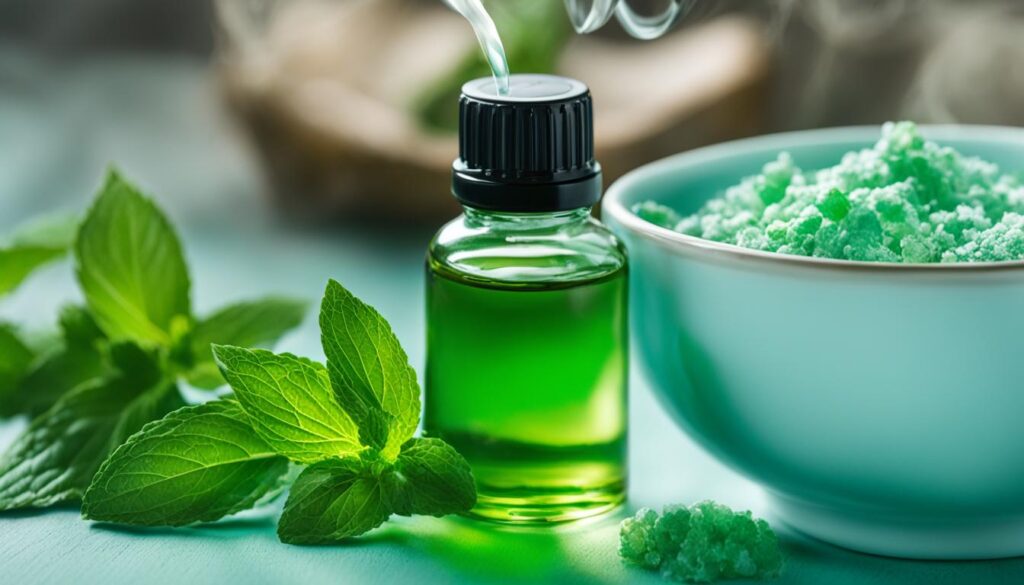Welcome to my article on the benefits of peppermint oil! Peppermint oil has gained popularity in recent years for its various uses and therapeutic properties. Derived from the leaves of the peppermint plant, this essential oil contains menthol and menthone, which contribute to its unique aroma and potential health benefits.
Peppermint oil can be used in a multitude of ways to support wellness, ranging from relieving digestive issues to providing natural remedies for headaches, skin problems, and even cold symptoms. However, it is important to exercise caution and consult with a healthcare professional before incorporating peppermint oil into your wellness routine.
Key Takeaways:
- Peppermint oil offers a wide range of uses and benefits for overall wellness.
- It can be used to relieve symptoms of irritable bowel syndrome (IBS) and promote healthy digestion.
- Peppermint oil may provide relief from headaches, including migraines and tension headaches.
- It has soothing properties that can benefit the skin, helping to reduce itching and inflammation.
- Peppermint oil has decongestant properties that can alleviate symptoms of the common cold.
Peppermint Oil for Digestion

Peppermint oil is a natural remedy that has been found to be effective in providing relief for digestion-related issues, including irritable bowel syndrome (IBS) and other gastrointestinal (GI) conditions. It has shown promise in reducing symptoms such as abdominal pain, bloating, and discomfort associated with these conditions.
A key component of peppermint oil, menthol, helps relax the smooth muscles of the GI tract, reducing inflammation and alleviating gastrointestinal distress. Additionally, peppermint oil can have an impact on the types of bacteria present in the gut.
There are two main ways to use peppermint oil for digestion. Firstly, it can be taken orally in the form of capsules. These capsules provide a convenient and standardized dosage of peppermint oil. Alternatively, peppermint oil can be applied topically on the abdomen for localized relief.
It’s crucial to consult with a healthcare professional before using peppermint oil for digestion, especially if you have any underlying health conditions or are taking medications. They can provide guidance on the appropriate dosage and help determine if peppermint oil is a suitable option for you.
Overall, peppermint oil offers a natural approach to managing digestive discomfort and can serve as a valuable addition to your wellness routine.
| Benefits of Peppermint Oil for Digestion | How to Use Peppermint Oil for Digestion |
|---|---|
| 1. Relieves symptoms of irritable bowel syndrome (IBS) | 1. Orally in the form of capsules |
| 2. Reduces abdominal pain and bloating | 2. Topical application on the abdomen |
| 3. Calms gastrointestinal inflammation | |
| 4. Affects the types of bacteria in the gut |
Note: Always consult with a healthcare professional before using peppermint oil for digestion or any other health concerns.
Peppermint Oil for Headaches

Peppermint oil has been widely used for its therapeutic properties in relieving headaches, including migraines and tension headaches. Its natural analgesic and cooling effects make it an effective remedy for soothing headache symptoms.
Studies suggest that the menthol content in peppermint oil helps alleviate pain, reduce inflammation, and promote relaxation, providing relief from headaches. Applying diluted peppermint oil topically on the temples, forehead, or neck can help soothe headache discomfort.
In addition to topical application, inhaling peppermint oil through steam inhalation or using it in a diffuser can also offer relief from headaches. The refreshing aroma of peppermint oil can help clear the mind, reduce stress, and ease headache-related tension.
It’s important to note that individual responses to peppermint oil may vary, and it is wise to consult with a healthcare professional for personalized advice. They can provide guidance on the appropriate use and dosage of peppermint oil for headache relief.
Peppermint oil can be a natural and effective alternative to over-the-counter pain medications for those seeking holistic remedies for headaches. However, it’s crucial to use high-quality peppermint oil from reputable brands and ensure proper dilution to prevent skin irritation. As with any new treatment, it’s best to test a small patch of skin before applying peppermint oil more extensively.
Peppermint Oil for Skin

Peppermint oil offers several benefits for the skin. It has antimicrobial, anti-inflammatory, and soothing properties that can help relieve itching, reduce redness and inflammation, and promote overall skin health.
When applied topically, peppermint oil can provide relief from itchiness caused by bug bites, hives, or skin conditions. Its cooling effect can help soothe the skin and alleviate discomfort. However, it’s important to dilute peppermint oil with a carrier oil, such as coconut oil or jojoba oil, to prevent skin irritation.
In addition to easing itching, peppermint oil may also stimulate hair growth when applied to the scalp. It improves blood circulation, providing essential nutrients to the hair follicles. The refreshing and invigorating properties of peppermint oil can help promote healthier hair and contribute to hair growth.
To ensure safety and avoid adverse reactions, it’s crucial to use peppermint oil cautiously. Before applying it to the skin or scalp, perform a patch test to check for any allergic reactions or sensitivities. Dilute the oil properly and avoid using it on broken or irritated skin.
Peppermint Oil for Colds

When it comes to finding natural remedies for colds, peppermint oil is a powerful ally. Its antiviral properties help combat cold viruses, while its decongestant properties can provide relief from nasal congestion and respiratory discomfort. Whether you’re dealing with a stuffy nose, a persistent cough, or a sore throat, peppermint oil can offer some much-needed relief.
One of the most effective ways to use peppermint oil for colds is through inhalation. You can add a few drops of peppermint oil to a steam inhaler or create a steam bath by adding a few drops to a bowl of hot water. Inhaling the steam infused with peppermint oil can help open up your airways, relieve congestion, and promote easier breathing. The cooling sensation of menthol in the oil provides a soothing effect on your respiratory system, offering relief from sore throat and sinus congestion.
If you prefer a more continuous method of inhalation, you can use a diffuser to disperse the vapor of peppermint oil throughout the room. This allows you to breathe in the beneficial properties of the oil consistently and enjoy its refreshing aroma. Just a few drops of peppermint oil in a diffuser can help clear your airways and promote a sense of well-being during cold and flu season.
Note: While peppermint oil can provide temporary relief from cold symptoms, it’s important to remember that it’s not a cure for the common cold. If you’re experiencing severe or persistent symptoms, it’s always best to seek medical advice.
Using peppermint oil for colds is a natural and holistic approach to managing symptoms and supporting respiratory health. Its effectiveness in relieving nasal congestion, coughs, and sore throat makes it a valuable addition to your cold-fighting arsenal. Just a few drops of peppermint oil can go a long way in providing relief and promoting your overall well-being during the cold season.
Benefits of Peppermint Oil for Colds:
- Antiviral properties to combat cold viruses
- Decongestant properties to relieve nasal congestion
- Soothing effect on the respiratory system
- Relieves coughs and sore throat
- Promotes easier breathing
How to Use Peppermint Oil

Peppermint oil offers various ways to incorporate its benefits into your wellness routine. Whether you’re addressing specific skin issues, seeking pain relief, or simply looking to promote relaxation, peppermint oil can be used topically, through diffusion, or even ingested. However, it’s important to remember that each method requires careful consideration and consultation with a healthcare professional.
Topical Application of Peppermint Oil
When using peppermint oil topically, it’s crucial to dilute it with a carrier oil to avoid skin irritation. The recommended ratio for dilution is generally 2-3 drops of peppermint oil per ounce of carrier oil, such as coconut or jojoba oil. This diluted mixture can then be applied to the skin for targeted benefits.
Ways to use peppermint oil topically:
- Massage: Combine a few drops of diluted peppermint oil with your favorite carrier oil and gently massage onto the skin for a soothing experience.
- Compress: Add a few drops of diluted peppermint oil to warm water, soak a clean cloth in the mixture, and apply it to the affected area for localized relief.
- Inhalation: For respiratory benefits, add a few drops of diluted peppermint oil to a bowl of hot water and inhale the steam. Alternatively, you can use a diffuser to disperse the oil’s aroma into the air.
Ingesting Peppermint Oil
Consult with a healthcare professional before ingesting peppermint oil and be cautious with the dosage, as it can be potent. Peppermint oil capsules provide a controlled and convenient way to consume the oil orally. Always follow the recommended dosage provided by the manufacturer or as advised by your healthcare professional.
Peppermint Oil in Capsule Form
Peppermint oil capsules offer the benefit of precise dosing and can be a convenient option for those looking to incorporate peppermint oil into their daily routine. It’s important to choose high-quality capsules from reputable brands and to follow the recommended dosage provided by the manufacturer or as advised by your healthcare professional.
You can find peppermint oil capsules in stores or online platforms that specialize in natural health products.
| Method | Benefits |
|---|---|
| Topical Application | – Targeted relief for specific skin issues – Soothing massage experience – Aromatic benefits through inhalation |
| Ingesting Peppermint Oil | – Controlled and precise dosage – Internal digestive support |
| Peppermint Oil Capsules | – Convenient and consistent dosing – Easy incorporation into daily routine |
Safety and Side Effects of Peppermint Oil
While peppermint oil offers various benefits, it’s crucial to prioritize safety and be aware of potential side effects when using it. Taking precautions ensures a positive and beneficial experience with peppermint oil.
Possible Side Effects
Peppermint oil is generally considered safe when used appropriately. However, some individuals may experience adverse reactions. It’s important to be aware of these potential side effects, including:
- Heartburn
- Allergic reactions
- Stomach pain
- Skin irritations
If any of these side effects occur, it’s advisable to discontinue use and consult with a healthcare professional for guidance.
Precautions
To ensure a safe experience with peppermint oil, the following precautions should be taken:
- Do a patch test: Before using peppermint oil topically, it’s recommended to perform a patch test. Apply a small amount of diluted oil to a small area of skin and wait 24 hours to check for any adverse reactions.
- Choose high-quality oil: Ensure you use peppermint oil from reputable brands that prioritize quality and purity.
- Follow recommended dosage: It’s essential to adhere to the recommended dosage guidelines provided by the manufacturer or a healthcare professional.
- Consult a healthcare professional: If you have any pre-existing health conditions or are taking medications, it’s advisable to consult with a healthcare professional before using peppermint oil.
- Pregnancy and breastfeeding: Pregnant and breastfeeding individuals should avoid using peppermint oil without consulting with a healthcare professional.
Buying and Using Peppermint Oil

When it comes to purchasing peppermint oil, I always prioritize choosing high-quality products from reputable brands. This ensures that I’m getting the most out of this versatile essential oil.
One important factor to consider is the quality of the peppermint oil. Look for oils that provide information about the plant’s Latin name, country of origin, and purity of the oil. This transparency allows you to make an informed decision and ensure that you’re buying a genuine, high-quality product.
Peppermint oil comes in various forms, including essential oil and extracts. Make sure to check the product description and choose the form that best suits your needs.
It’s crucial to follow the manufacturer’s guidelines for usage and dilution ratios. Peppermint oil is highly concentrated, so it’s important to use it in the recommended amounts to avoid any adverse effects. Diluting it with a carrier oil such as almond or jojoba oil is usually necessary before applying it to the skin.
You can find peppermint oil in supermarkets, pharmacies, wellness shops, and online platforms. Take the time to read reviews and check the reputation of the brand before making a purchase.
Once you have your peppermint oil, make sure to store it properly in a cool, dark place. This helps maintain its quality and extends its shelf life.
Investing in a high-quality and well-sourced peppermint oil ensures that you’re getting the maximum benefits and value for your money.
Highlighted Quote:
“Choosing high-quality peppermint oil from reputable brands ensures that you’re getting the full benefits of this versatile essential oil.” – [Your Name]
Conclusion
Peppermint oil offers a wide range of benefits for wellness. Its natural and holistic properties have been utilized for centuries to provide relief from digestive issues, headaches, skin problems, and respiratory discomfort. Incorporating peppermint oil into a holistic and natural personal care routine can be a valuable addition to promote overall well-being.
However, it is important to use peppermint oil safely and responsibly. Before using peppermint oil, it is advised to consult with a healthcare professional to ensure it is suitable for your specific needs and to determine the appropriate dosage for your individual circumstances.
When purchasing peppermint oil, it is crucial to choose high-quality products from reputable brands. Look for oils that provide detailed information about the plant’s Latin name, country of origin, and the purity of the oil. Storing peppermint oil properly in a cool, dark place will help maintain its quality and extend its shelf life.
In summary, the numerous benefits of peppermint oil make it a versatile and effective option for natural remedies. By using peppermint oil responsibly and selecting quality products, individuals can harness its potential and incorporate it into their wellness routines, contributing to a healthier and more balanced lifestyle.
FAQ
What are the benefits of peppermint oil?
Peppermint oil offers various benefits for wellness, including relief from digestion issues, headaches, skin problems, and respiratory discomfort.
Can peppermint oil be used for digestion?
Yes, peppermint oil has been found to be effective in relieving symptoms of irritable bowel syndrome (IBS) and other gastrointestinal (GI) conditions.
How can peppermint oil help with headaches?
Peppermint oil has analgesic and cooling properties that can help relieve headaches, including migraines and tension headaches.
Does peppermint oil have any benefits for the skin?
Yes, peppermint oil has antimicrobial, anti-inflammatory, and soothing properties that can help relieve itching, reduce redness and inflammation, and promote overall skin health.
Can peppermint oil be used for colds?
Yes, peppermint oil can provide relief from symptoms of the common cold by clearing nasal congestion, relieving coughs, and soothing respiratory discomfort.
What are the different ways to use peppermint oil?
Peppermint oil can be applied topically on the skin, inhaled through steam, used in a diffuser, or taken orally in the form of capsules.
Are there any safety precautions or side effects of using peppermint oil?
While peppermint oil is generally safe, some individuals may experience side effects such as heartburn, allergic reactions, stomach pain, and skin irritations. It’s important to do a patch test and consult with a healthcare professional if any adverse reactions occur.
How can I choose high-quality peppermint oil?
When purchasing peppermint oil, look for products that provide information about the plant’s Latin name, country of origin, and purity. Choose reputable brands and store the oil properly in a cool, dark place.
What is the conclusion about peppermint oil benefits?
Peppermint oil offers a wide range of benefits, but it’s important to use it safely, consult with a healthcare professional, and choose high-quality products. Individual responses may vary.






